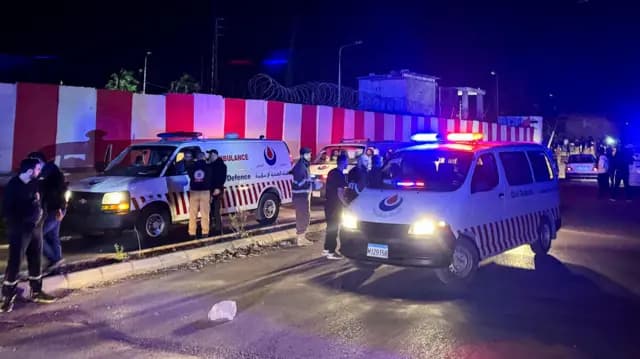We're loading the full news article for you. This includes the article content, images, author information, and related articles.
The attack on Ein el-Hilweh, Lebanon's largest refugee camp, escalates regional tensions. For Kenya, the incident heightens concerns for its thousands of nationals in a volatile Lebanon, where government evacuation efforts are already strained.

An Israeli airstrike near the Ein el-Hilweh Palestinian refugee camp in southern Lebanon killed at least 13 people and wounded several others on Tuesday, November 18, 2025, according to Lebanon's Health Ministry. The strike has intensified already high tensions in a region grappling with ongoing hostilities. The Israel Defense Forces (IDF) stated its aircraft targeted a Hamas training compound used to plan and execute attacks against Israel. Hamas vehemently denied this claim, stating the location was a sports field and that there are no military installations in Lebanon's refugee camps.
The attack occurred in a densely populated area on the outskirts of the coastal city of Sidon. Images from the scene showed emergency services navigating the narrow streets of the camp as smoke billowed from the targeted site. The incident is the deadliest of its kind in Lebanon since January 2025, underscoring the fragility of a ceasefire agreement brokered in November 2024 that was intended to halt more than a year of hostilities between Israel and the Iran-backed group Hezbollah.
The IDF asserted that the strike was a precision operation against a legitimate military target, stating it took measures to mitigate civilian harm, including using precise munitions and aerial surveillance. In contrast, Hamas condemned the attack as a "barbaric assault" on civilians, alleging the strike hit an open sports field frequented by young people. Hezbollah, a key actor in the region, also condemned the strike, stating it killed civilians. The Lebanese Health Ministry has not distinguished between civilian and combatant casualties in its reported death toll.
The strike is part of a broader, protracted conflict. Since Hamas's attack on Israel on October 7, 2023, cross-border exchanges between Israel and Hezbollah have been a near-daily occurrence, leading to significant displacement on both sides of the border. Israel has repeatedly stated it will act against Hamas and other militant groups operating from Lebanese territory.
Ein el-Hilweh, established in 1948, is the largest of Lebanon's 12 Palestinian refugee camps, with a registered population of over 64,000 according to UNRWA, though estimates suggest the actual number, including refugees from Syria, is closer to 80,000. The camp is characterized by overcrowding, poverty, and high unemployment. Security is a major concern, with various Palestinian factions competing for influence, creating a tense environment. The Lebanese Armed Forces do not enter the camp, which has led to it being described as a "zone of unlaw." The influx of refugees from the Syrian conflict has further strained the camp's already overstretched resources and infrastructure.
The escalating violence in Lebanon poses a significant risk to the thousands of Kenyans, predominantly domestic workers, residing in the country. The Kenyan government has faced challenges in its efforts to evacuate its nationals from the volatile region. In October 2024, Foreign Affairs Secretary Musalia Mudavadi highlighted difficulties, including limited flight availability to Beirut and high insurance costs, which complicate repatriation efforts. The government allocated KES 100 million for evacuations and has been urging Kenyans in Lebanon to register with the authorities. However, past reports have detailed allegations of neglect and abuse by the Kenyan consulate in Beirut, which has been closed since January 2022, forcing community leaders to fill the void in assisting stranded workers. The latest strike underscores the precarious security situation for Kenyan citizens and the urgent need for effective consular support and evacuation plans.
Broader geopolitical shifts in the Middle East, particularly the Iran-Israel proxy conflict, have ripple effects across Africa, influencing security dynamics and economic stability. For East Africa, a major concern is the potential for disrupted global oil prices, which could deliver another economic shock to a region already facing challenges. While direct diplomatic ties between Kenya and Lebanon are limited, the safety of Kenyan workers remains a critical foreign policy concern.
Keep the conversation in one place—threads here stay linked to the story and in the forums.
Sign in to start a discussion
Start a conversation about this story and keep it linked here.
Other hot threads
E-sports and Gaming Community in Kenya
Active 9 months ago
The Role of Technology in Modern Agriculture (AgriTech)
Active 9 months ago
Popular Recreational Activities Across Counties
Active 9 months ago
Investing in Youth Sports Development Programs
Active 9 months ago